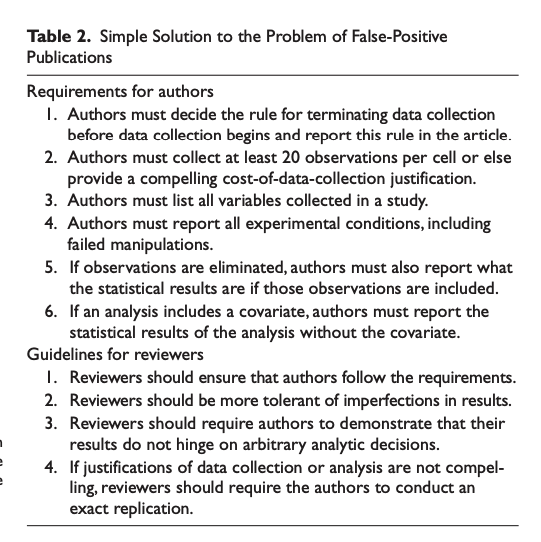2024-10-14 Mon
Work session on p-hacking
Rick Gilmore
Overview
On this day
- Columbus Day or Indigenous People’s Day or Dia de la Raza or…
Announcements
- Due today
- Due this Friday, October 18
- Final project proposal
Last time…
Questionable research practices
Defensible choice or questionable practice?
- In a paper, failing to report all of a study’s dependent measures
- Deciding whether to collect more data after looking to see whether the results were significant
- In a paper, failing to report all of a study’s conditions
- Stopping collecting data earlier than planned because one found the result that one had been looking for
- In a paper, “rounding off” a p value (e.g., reporting that a p value of .054 is less than .05)
- In a paper, selectively reporting studies that “worked”
- Deciding whether to exclude data after looking at the impact of doing so on the results
- In a paper, reporting an unexpected finding as having been predicted from the start
- In a paper, claiming that results are unaffected by demographic variables (e.g., gender) when one is actually unsure (or knows that they do)
- Falsifying data
More on Simmons, Nelson, & Simonsohn (2011)
- Researcher choices can inflate false positive rates
- Collecting more data after analyzing a small initial sample inflates the false positive rate
- Just because a statistical test met the criterion threshold (\(\alpha\)) with a small sample doesn’t mean it will do so with larger samples
Recommendations
Today
Work Session: P-hacking and Final Project Proposals
- Exercise 05: P-hack your way to scientific glory write-up.
- Final project proposals
Set-up for group discussion…
- Enter (anonymized) data into a spreadsheet
https://docs.google.com/spreadsheets/d/1NXcBrI_bMP_wFi1BurCS5WGppr9HWBiF5ulh7ch61MU/edit?usp=sharing
- Choose a student_id (integer) for yourself (not your PSU ID or phone number)
Evaluating p-hacking
Our results
- Who got a “significant” result?
- How many different analyses did you try?
- Who changed their analysis after finding a significant result?
- Did anyone try another analysis–after you got a significant result–and keep the non-significant result?
- Visualizations of the data
- Do we have good evidence about which party harms or helps the economy?
- Why or why not?
- What is p-hacking?
- Did you p-hack? Did another classmate? Why do you think so?

You are entitled to your own opinion, but you are not entitled to your own facts.
Next time
Prevalence of QRPs
- Discuss
- John, Loewenstein, & Prelec (2012)
Resources
References
John, L. K., Loewenstein, G., & Prelec, D. (2012). Measuring the prevalence of questionable research practices with incentives for truth telling. Psychological Science, 23(5), 524–532. https://doi.org/10.1177/0956797611430953
Simmons, J. P., Nelson, L. D., & Simonsohn, U. (2011). False-positive psychology: Undisclosed flexibility in data collection and analysis allows presenting anything as significant. Psychological Science, 22(11), 1359–1366. https://doi.org/10.1177/0956797611417632

